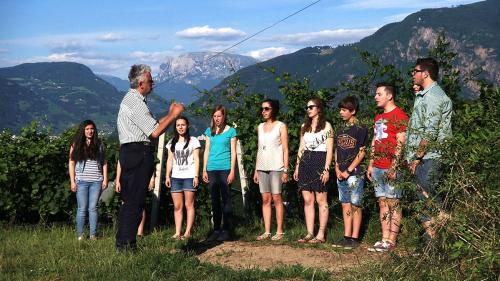Mrova

1/6
Landschaft Macht Kapital (2015) images from the video documentation of the intervention with the flag HD video, 16:9, stereo, 5:30 minutes, Dolomites, South Tyrol

2/6
"SOLIDARITY" AND "RESISTANCE" (2015) two-channel HD video installation, 13:00 minutes, loop. filmed on location in St. Pauls - Eppan and Bozen / Bolzano Bahnhof, South Tyrol

3/6
"SOLIDARITY" AND "RESISTANCE" (2015) two-channel HD video installation, 13:00 minutes, loop. filmed on location in St. Pauls - Eppan and Bozen / Bolzano Bahnhof, South Tyrol

4/6
"SOLIDARITY" AND "RESISTANCE" (2015) two-channel HD video installation, 13:00 minutes, loop. filmed on location in St. Pauls - Eppan and Bozen / Bolzano Bahnhof, South Tyrol
‘I’m drawn to the hidden stories of people that aren’t represented in history; to the issues that get swept under the carpet and camouflaged in the landscape’ Mrova
Negotiating the capacious and complex terrain of Mrova’s practice is by no means an easy matter. She operates at the intersection of art, philosophy, social and political theory, activism and hacking, carving out a unique space in which the conditions of possibility for collective subversion and ethical action are deconstructed and reconfigured. The presented works include: a video installation with two films entitled ‘Solidarity’ and ‘Resistance’, in which the St. Pauls/Eppan youth choir performs a song in German, ‘Das Solidaritätslied’ written by Bertolt Brecht, outside the railway station in Bolzano/Bozen and another, the popular Italian partisan song ‘Bella Ciao’, in front of a fascist bunker in the South Tyrolean countryside. A longer film ‘Learning Solidarity and Resistance’ documents the process during one of the choir rehearsals preceding the performances, led under the supervision of Hansjörg Menghin. In addition to these are the videos ‘Landschaft Macht Kapital’ and ‘In Solidarity – Yours Truly’, both of which depict, in various ways, a performative intervention by the artist in nature and urban space. The exhibition also comprises a selection of her photographic works and small-scale installations, as well as a compendium of song lyrics and texts chosen by Mrova.
I observe, read and listen carefully to the complete collection of Mrova’s exhibited works and nd myself propelled by a sense of gravitas, beauty, hope and unanimity; one that is laced with an urgent concern for the brutal inequalities and injustices of the past and present. In each work a disjunction seems to occur: The golden flag marked with the words ‘Land’ ‘Power’ ‘Capital’ – in German the title also reads ‘Landscape makes Capital’ – swerve solemnly over the undulant, open South Tyrolean landscape; the song of solidarity smacks of irony and humour against the image of a solitary runner and the mechanical sound of a treadmill – the capitalist race to self-improvement and prosperity echo in the background; the choir’s young voices and revolutionary words spread with unnerving tension throughout the railway station where migrants and refugees have suffered the violence of political and social exclusion.
Indeed, between myself and each of the above works there is a disproportion – a moment of absolute uncertainty – which grants me the chance to intervene in the meaning, and, as such, to participate in the future of the work. One could say that the work of art, in this regard, has the form of an event. For example, when engaging with the lm ‘Landschaft Macht Kapital’ or ‘Solidarity’ I have an experience that cannot be fully grasped and therefore compels me to respond to the work by remaining open to the unknowability of what is to come. What will happen as more and more European countries increase their border controls and shut their doors to the millions of displaced asylum-seekers and refugees? What is the meaning of solidarity and hospitality today? How do we create spaces of resistance? The indeterminacy of the event is humbling in so far as it robs me of any power to identify the future of the artwork, myself and the world of others; it opens me to the incalculable.
Let me try to gloss these last remarks by recalling some of the thoughts of the French philosopher Jacques Derrida on the relationship between the eventfulness of art and hospitality.
In ‘A Taste for the Secret‘ (2001) Derrida writes, ‘Opening oneself to what comes can be a way of exposing oneself to the future or to the coming of the other, to the coming of what does not depend on me’. He calls this meeting with the other a chance event. A little further on he continues, ‘And this relation to the event or alterity, as well as to chance or the occasion, leaves us completely disarmed; and one has to be disarmed’. According to Derrida, only if I lack a certain strength can something truly happen; that is to say, there has to be a weakness, a limit, for there to be a future as such: a relation to the incalculable, the other, i.e. justice.
‘If there is pure hospitality, or a pure gift, it should consist in this opening without horizon, without horizon of expectation, an opening to the newcomer whoever that may be.’ By the same token, Slavoj Žižek in ‘The Neighbor’ (2006) explains that ‘To recognize the Other is thus not primarily or ultimately to recognize the Other in a certain well-de ned capacity (“I recognize you as... rational, good, lovable”), but to recognize you in the abyss of your very impenetrability and opacity.’
Thus the moment of responsibility, as Derrida astutely points out, supposes a break with knowledge – a sort of interruption of self, or ‘passive’ decision’. Perhaps this is why Derrida suggests that an act of hospitality can only be poetic. For what turns out to be interrupted, in the event of hospitality, much like in the event of the work of art or poetry, is nothing less than the very notion of truth as revelation and complete transparency.
Mrova’s practice, by insisting on the eventfulness of art and opacity of meaning, appeals to our fundamental and unconditional obligation as fellow human beings to respond to the singular and distinctive happenings of today and thereby remain vigilant about the course of our shared future. In her artworks we nd allusions to hidden power structures, histories, mem- ories, geopolitical and economic relations, all of which open up a way of thinking about the ambivalent event of hospitality and soli- darity as a poetic experience.
I end with a passage from Derrida on the task of a philosophy of deconstruction:
‘If there is a categorical imperative, it consists in doing everything for the future to remain open. Herein lies something that resembles an ethical dimension, because the future is the opening in which the other happens, and it is the value of the other or of alterity that, ultimately would be the justification – to leave a place for the other to come if she comes. It is the ethic of hospitality.’
‘I’m drawn to the hidden stories of people that aren’t represented in history; to the issues that get swept under the carpet and camouflaged in the landscape’ Mrova
Verhandlungen über das weitläufige und komplexe Gelände von Mrovas Praxis sind keineswegs eine einfache Angelegenheit. Sie arbeitet an der Schnittstelle von Kunst, Philosophie, sozialer und politischer Theorie, Aktivismus und Hacking und schafft einen einzigartigen Raum, in dem die Bedingungen der Möglichkeit für gemeinsame Subversion und ethisches Handeln dekonstruiert und neu konfiguriert werden. Die vorgestellten Arbeiten umfassen eine Videoinstallation mit zwei Filmen namens Solidarität und Widerstand, in denen der Jugendchor von St. Pauls/Eppan jeweils ein Lied in deutscher Sprache aufführt, Das Solidaritätslied von Bertolt Brecht vor dem Bahnhof in Bolzano/Bozen und das beliebte italienische Partisanenlied Bella Ciao vor einem faschistischen Bunker auf dem Land in Südtirol. Ein längerer Film, „Learning Solidarity and Resistance“, dokumentiert den Prozess während einer der Chorproben vor den Aufführungen unter der Leitung von Hansjörg Menghin. Zusätzlich zeigen die Videos „Landschaft Macht Kapital“ und „In Solidarity – Yours Truly“ beide auf verschiedene Weise eine performative Intervention der Künstlerin in der Natur und im Stadtraum. Die Ausstellung umfasst auch eine Auswahl ihrer Fotoarbeiten und kleineren Installationen sowie ein Kompendium von Liedern und anderen Texten von Mrova.
Ich beobachte, lese und höre sorgfältig die komplette Sammlung von Mrova ausgestellten Werken und nde mich von einem Gefühl der gravitas, Schönheit, Hoffnung und Einstimmigkeit erfüllt, das mit einer drängenden Betroffenheit über die brutalen Ungleichheiten und Ungerechtigkeiten der Vergangenheit und Gegenwart verbunden ist. In jedem Werk scheint eine Disjunktion aufzutreten: Die goldene Flagge mit den Worten „Landschaft“, „Macht“ und „Kapital“ weht feierlich über der hügeligen, offenen Südtiroler Landschaft; das Solidaritätslied strotzt von Ironie und Humor im Kontrast zu dem Bild eines einsamen Läufers und dem mechanischen Geräusch eines Laufbandes – das kapitalistische Rennen nach Selbstoptimierung und Wohlstand hallt im Hintergrund wider; die jungen Stimmen und revolutionären Worte des Chores verbreiten sich mit zermürbender Spannung im gesamten Bahnhof, wo Migranten und Flüchtlinge die Gewalt politischer und sozialer Ausgrenzung erlitten haben.
Tatsächlich gibt es zwischen mir und jeder der oben genannten Arbeiten ein Missverhältnis – ein Moment der absoluten Unsicherheit –, das mir die Chance gewährt, in den Sinn zu intervenieren und mich somit an der Zukunft der Arbeit zu beteiligen. Man könnte sagen, dass das Kunstwerk in dieser Hinsicht die Form eines Ereignisses hat. Zum Beispiel mache ich, wenn ich mich mit den Filmen „Landschaft Macht Kapital“ oder „Solidaritätslied“ beschäftige, eine Erfahrung, die nicht vollständig erfasst werden kann und mich deshalb dazu zwingt, auf die Arbeit zu reagieren, indem ich offen für die Unerkennbarkeit dessen bleibe, was kommen wird. Was wird passieren, wenn immer mehr europäische Länder ihre Grenzkontrollen verschärfen und ihre Türen für die Millionen von Asylbewerbern und Flüchtlingen schließen?
Was ist die Bedeutung von Solidarität und Gastfreundschaft heute? Wie schaffen wir Räume des Widerstands? Die Unbestimmtheit der Veranstaltung lässt mich demütig werden, indem sie mir jede Macht raubt, die Zukunft des Werkes, mich und die Welt der anderen zu erkennen; sie öffnet mich für das Unberechenbare.
Lassen Sie mich versuchen, diese letzten Bemerkungen durch einige Gedanken des französischen Philosophen Jacques Derrida zur Beziehung zwischen der Er- eignishaftigkeit von Kunst und der Gastfreundschaft erläutern.
In „A Taste for the Secret„ (2001) schreibt Derrida: „Sich dem was kommt zu öffnen kann ein Weg sein, sich der Zukunft auszuliefern oder dem Kommen des Anderen, dem Kommen von etwas, das nicht auf mich angewiesen ist.“ Er nennt diese Begegnung mit dem anderen ein zufälliges Ereignis.
Etwas später fährt er fort: „Und dieses Verhältnis zum Ereignis oder zur Alterität, genauso wie dem zum Zufall oder Anlass, läßt uns völlig entwaffnet zurück; und man muss entwaffnet sein.“ Für Derrida kann also nur dann, wenn mir eine gewisse Stärke fehlt, etwas passieren; das heißt, es muss eine Schwäche, eine Grenze geben, damit es eine Zukunft als solche geben kann: eine Beziehung zum anderen, das heißt Gerechtigkeit.
„Gibt es die reine Gastfreundschaft, oder die echte Gabe, dann geschieht sie in dieser Öffnung ohne Horizont; ohne Horizont der Erwartung; eine Öffnung dem Neuankömmling, wer auch immer das sein mag.“ aus dem gleichen Grund erklärt Slavoj Žižek in „The Neighbor“ (2006): „Das Andere zu erkennen bedeutet folglich weder zunächst noch letztlich, das Andere in einem bestimmten, fest umrissenen Raum zu erkennen (,Ich erkenne dich als ... rational, gut, liebenswürdig‘), sondern dich im Abgrund gerade deiner Undurchdringlichkeit und Undurchsichtigkeit zu erkennen.“ Somit setzt die Zeit der Ver- antwortung, wie Derrida scharfsinnig hinweist, einen Bruch mit dem Wissen voraus – eine Art Unterbrechung des Selbst oder „passive“ Entscheidung. Vielleicht ist dies, weshalb Derrida nahelegt, dass ein Akt der Gastfreundschaft nur poetisch sein kann. Denn das, was sich bei der Gast- freundschaft ähnlich wie bei Kunstwerken oder Poesie als unterbrochen erweist, ist nichts weniger als der Begriff der Wahrheit als Offenbarung und vollständiger Transparenz.
Mrovas Praxis beruft sich durch das Beharren auf dem Ereignischarakter der Kunst und der Opazität von Bedeutung auf unsere tief verwurzelte und unbedingte Verpflichtung als Menschen, auf die einzigartigen und unverwechselbaren Ereignisse von heute zu antworten und im Verlauf unserer gemeinsamen Zukunft wachsam zu bleiben. In ihren Arbeiten nden wir Hinweise auf verborgene Machtstrukturen, Geschichten, Erinnerungen, geopolitische und wirtschaftliche Beziehungen, die uns alle eine Möglichkeit eröffnen, über das ambivalente Gesetz der Gastfreundschaft und Solidarität als poetische Erfahrung nachzudenken.
Ich schließe mit einer Passage von Derrida über die Aufgabe der Dekonstruktion:
„Gibt es einen kategorischen Imperativ, dann besteht er darin, alles zu tun, da- mit die Zukunft offen bleibt. Hierin liegt etwas, das ethischen Dimensionen gleicht, da die Zukunft die Öffnung bildet, in der das Andere geschieht, und es ist der Wert des Anderen oder der Alterität, der letzendlich der Berechtigung dient – der Anderen Raum lassen, zu kommen, sollte sie kommen. Das ist die Ethik der Gast- freundschaft.“
Zitate frei übersetzt von Elisabeth Obermeier

1/6
Landschaft Macht Kapital (2015) images from the video documentation of the intervention with the flag HD video, 16:9, stereo, 5:30 minutes, Dolomites, South Tyrol

2/6
"SOLIDARITY" AND "RESISTANCE" (2015) two-channel HD video installation, 13:00 minutes, loop. filmed on location in St. Pauls - Eppan and Bozen / Bolzano Bahnhof, South Tyrol

3/6
"SOLIDARITY" AND "RESISTANCE" (2015) two-channel HD video installation, 13:00 minutes, loop. filmed on location in St. Pauls - Eppan and Bozen / Bolzano Bahnhof, South Tyrol

4/6
"SOLIDARITY" AND "RESISTANCE" (2015) two-channel HD video installation, 13:00 minutes, loop. filmed on location in St. Pauls - Eppan and Bozen / Bolzano Bahnhof, South Tyrol

